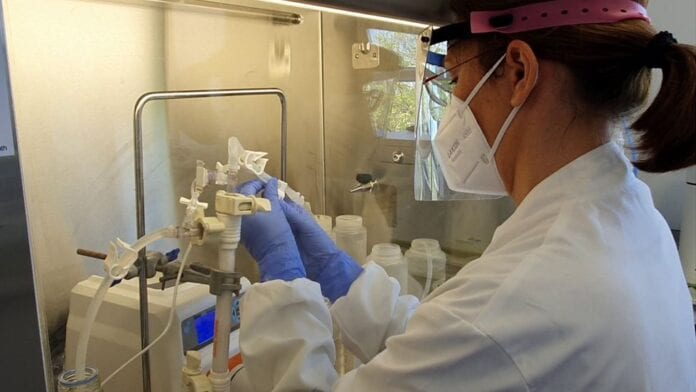One year on: Welsh businesses and researchers in the battle against COVID-19
- Publicly funded researchers and businesses in Wales are making a huge difference in tackling COVID-19, helping us to better understand the disease and combatting the impact of the pandemic on people’s lives
- From helping to make working practices safer for carers, to dramatically reducing ambulance decontamination times, researchers and businesses in Wales are coming up with creative ways to beat COVID-19 and its effects
- These projects are just a snapshot of work carried out by people and businesses in Wales, funded by UK Research & Innovation (UKRI)
Over the past year, up and down the UK, thousands of research and innovation projects have been publicly funded to tackle the pandemic. Researchers and businesses in the South East are playing a key role in how the UK is combatting COVID-19. Their work forms part of a £550 million COVID-19 rapid investment programme by UK Research and Innovation (UKRI) – the largest public funder of research and development in the UK.
The diversity of UKRI-funded projects is vast – from the world’s first COVID-19 treatments and vaccines, to projects that help us understand and mitigate the impact of the pandemic on our economy, environment, education, arts sector and mental health. This funding builds on decades of public investment and research expertise which have provided the backbone to our national COVID-19 response.
Some of the top universities in Wales have received significant UKRI funding. Working closely with charity Cancer Research UK, a Cardiff University study is surveying at least 3,500 people to measure changing attitudes and behaviours about cancer during the pandemic, including whether people may be less likely to seek medical help for early signs of cancer. Its insights will help to develop clear public health messages. Recently released findings showed nearly half of people with potential cancer symptoms in the first wave of the pandemic did not contact their GP.
Cardiff University is also working on a separate project to generate rapid, high-quality evidence to help make working practices safer and provide additional support for care workers. This project looks to reduce the COVID-19 death rates of care workers that have been double that of healthcare workers since the start of the pandemic.
At Swansea University, the SPECIFIC Innovation and Knowledge Centre is adapting its expertise to the COVID-19 response. It quickly built a manufacturing plant for hand sanitiser to supply the NHS locally and continues to work on two further projects: using ozone technology to reduce ambulance decontamination times from three hours to just 20 minutes, and developing sensors to check that patients on ventilators are getting enough oxygen and can be managed by medical staff remotely.
Professor Alan Watkins from Swansea University said: “Our funding from UKRI was integral to the development of our project. Ambulance services use different models to sort and prioritise callers and with UKRI’s funding we will investigate which model worked most effectively during the first wave of COVID-19. We hope our project will help inform emergency services on the best practices to ensure the right patients are seen by ambulance service and emergency department staff, without overwhelming NHS services.”
A specialist research team also at Swansea University is rapidly analysing data from numerous sources across the UK to ensure policymakers and healthcare providers have a detailed insight into the evolving pandemic. The project will help scientists to understand why certain people appear to be greater risk. The University is issuing weekly reports on exposure risks, incidence and outcomes to the Welsh Government and SAGE.
Professor Charlotte Deane, COVID-19-Response Director at UKRI said: “Looking back over the past year, it’s clear that the pandemic has had a devastating impact on so many aspects of our lives, but I take more than a glimmer of hope from the extraordinary work being undertaken by researchers and businesses across the UK. These projects are just the tip of the iceberg. They show the tenacity and creativity of our research and innovation communities in Wales and beyond, who have stepped up in the most challenging of times to come together and fight back against this devastating disease.”
These projects are among 3,600 new COVID-19 projects, totalling over £554 million, being funded by UKRI across the country in response to Covid-19.
Help keep news FREE for our readers
Supporting your local community newspaper/online news outlet is crucial now more than ever. If you believe in independent journalism, then consider making a valuable contribution by making a one-time or monthly donation. We operate in rural areas where providing unbiased news can be challenging. Read More About Supporting The West Wales Chronicle
























